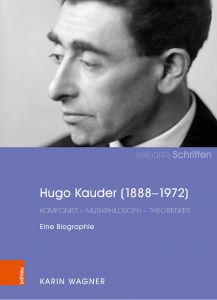Karin Wagner, Hugo Kauder (1888–1972): Komponist – Musikphilosoph – Theoretiker, Eine Biographie (exil.arte-Schriften 4) (Vienna, Cologne, Weimar: Böhlau, 2018); ISBN: 978-3-205-20015-4.
With her recent monograph on Hugo Kauder (1888–1972) published in 2018 as part of the series exil.arte-Schriften, musicologist Karin Wagner has given the interested reading public a biography of a composer, music philosopher, and theoretician who was forced to flee National Socialist-ruled Austria. The author provides insights into the emotional world of a protagonist who was raised in a rural environment and then found fulfilment in Europe’s musical metropolis. She structures this biography according to the stages of Kauder’s life: Tobitschau/Tovacov in Moravia, the city of his childhood in a musically isolated, devoutly Jewish environment; Vienna, the city of his musical awakening in exchange with Karl Weigl, Alexander Zemlinsky, Robert Fuchs, and Gustav Mahler; and finally New York, a city for where music could arrive, survive, and thrive.

Between Vienna and New York, the author inserts the turbulent chapter Pause zwischen Vergangenheit und Zukunft [Intermission between the Past and the Future], which contains a sequence of pivotal episodes: Kauder’s experience of the Anschluss [Nazi Germany’s “annexation” of Austria] in Vienna and his increasingly important exchange with Schönberg pupil Hermann Grab during this period, Kauder’s process of grappling with the notions of escape and exile, and his inevitably necessary but fortunate escape from Vienna in 1938. Wagner allows her protagonist to be heard frequently in the form of letters such as those he wrote to the philosopher Rudolf Pannwitz. In this way, readers are afforded an inside look at Kauder’s emigration, which took him first to the Netherlands and subsequently to his wife and son in London a few months later, and they also learn of the impressions had by Kauder upon his February 1940 arrival in New York—the final destination of an emigratory odyssey that, for him, was a matter of “once and for all” (“Ein=für allemal”, 146)—meaning that he would never return to Vienna. The author frames all of these life situations with a detailed analysis of Kauder’s musical output, including his development of a theory of scales in Vienna based on the ancient Greek tetrachord system that he later on—as a “passionate teacher” in New York—combined with counterpoint, leading to teaching job offers from various American universities. Author Wagner rounds out this biography with the first comprehensive catalogue of Kauder’s works and also surprises readers with selected correspondence in the appendix.

